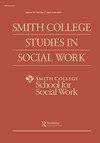Facilitating Transformation in Workforce Training: Using Clinical Theory to Understand Psychological Self-Sufficiency
IF 0.9
Q2 SOCIAL WORK
引用次数: 15
Abstract
ABSTRACT Acknowledging the scarcity of a bottom up social work practice model in facilitating the development of success in workforce development programs, this study explores Psychological self-sufficiency (PSS) as an emerging social work practice theory. Phenomenological studies of low-income jobseekers in employment training along with the empirical validation of measures of the core constructs of PSS – employment hope scale (EHS) and perceived employment barrier scale (PEBS) – and testing of the theoretical model resulted in the emergence of a new theory of PSS. PSS was conceptually defined as a dynamic and internal drive that activates the process of transforming cognitively and affectively perceived barriers into hope driven action – the process that enables individuals to move forward toward goals. Based on the evidence of PSS, a participant-centered group intervention model called transforming impossible into possible (TIP) program was developed. This article delineates the trajectory of PSS theory development by critically reviewing various streams of practice theories influencing the PSS theory. Next, the conditions that necessitated the creation of the TIP program and its core principles underlying the functions of PSS are explained. By depicting the TIP program with direct quotes of clients’ experiences, authors exemplify the successful self-discovery process through enhanced PSS skills as a result of participating in the TIP program.促进劳动力培训转型:运用临床理论理解心理自给
认识到自下而上的社会工作实践模式在促进劳动力发展计划成功发展方面的稀缺性,本研究探讨了心理自给自足(PSS)作为新兴的社会工作实践理论。通过对低收入求职者就业培训的现象学研究,以及对就业希望量表(EHS)和就业障碍感知量表(PEBS)的实证验证,以及对理论模型的检验,产生了新的就业希望量表理论。PSS在概念上被定义为一种动态的内在驱动力,它激活了将认知和情感上感知到的障碍转化为希望驱动的行动的过程——这一过程使个人能够朝着目标前进。基于PSS的证据,提出了一种以参与者为中心的群体干预模型,即“不可能转化为可能”(TIP)计划。本文通过批判性地回顾影响PSS理论的各种实践理论流,勾勒出PSS理论发展的轨迹。接下来,解释了创建TIP计划的必要条件及其作为PSS功能基础的核心原则。通过直接引用客户的经验来描述TIP计划,作者举例说明了通过参与TIP计划而提高PSS技能的成功自我发现过程。
本文章由计算机程序翻译,如有差异,请以英文原文为准。
求助全文
约1分钟内获得全文
求助全文
来源期刊

SMITH COLLEGE STUDIES IN SOCIAL WORK
SOCIAL WORK-
CiteScore
1.50
自引率
10.00%
发文量
10
期刊介绍:
Smith College Studies in Social Work focuses on the vital issues facing practitioners today, featuring only those articles that advance theoretical understanding of psychological and social functioning, present clinically relevant research findings, and promote excellence in clinical practice. This refereed journal addresses issues of mental health, therapeutic process, trauma and recovery, psychopathology, racial and cultural diversity, culturally responsive clinical practice, intersubjectivity, the influence of postmodern theory on clinical practice, community based practice, and clinical services for specific populations of psychologically and socially vulnerable clients.
 求助内容:
求助内容: 应助结果提醒方式:
应助结果提醒方式:


